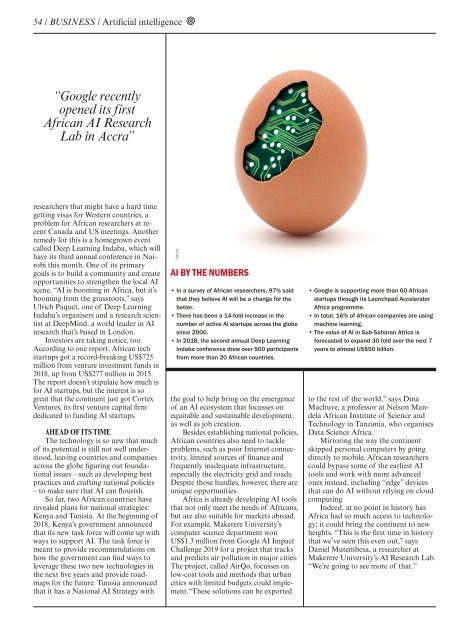Create successful ePaper yourself
Turn your PDF publications into a flip-book with our unique Google optimized e-Paper software.
54 / BUSINESS / Artificial intelligence<br />
“Google recently<br />
opened its first<br />
African AI Research<br />
Lab in Accra”<br />
researchers that might have a hard time<br />
getting visas for Western countries, a<br />
problem for African researchers at recent<br />
Canada and US meetings. Another<br />
remedy for this is a homegrown event<br />
called Deep Learning Indaba, which will<br />
have its third annual conference in Nairobi<br />
this month. One of its primary<br />
goals is to build a community and create<br />
opportunities to strengthen the local AI<br />
scene. “AI is booming in Africa, but it’s<br />
booming from the grassroots,” says<br />
Ulrich Paquet, one of Deep Learning<br />
Indaba’s organisers and a research scientist<br />
at DeepMind, a world leader in AI<br />
research that’s based in London.<br />
Investors are taking notice, too.<br />
According to one report, African tech<br />
startups got a record-breaking US$725<br />
million from venture investment funds in<br />
2018, up from US$277 million in 2015.<br />
The report doesn’t stipulate how much is<br />
for AI startups, but the interest is so<br />
great that the continent just got Cortex<br />
Ventures, its first venture capital firm<br />
dedicated to funding AI startups.<br />
AHEAD OF ITS TIME<br />
The technology is so new that much<br />
of its potential is still not well understood,<br />
leaving countries and companies<br />
across the globe figuring out foundational<br />
issues – such as developing best<br />
practices and crafting national policies<br />
– to make sure that AI can flourish.<br />
So far, two African countries have<br />
revealed plans for national strategies:<br />
Kenya and Tunisia. At the beginning of<br />
2018, Kenya’s government announced<br />
that its new task force will come up with<br />
ways to support AI. The task force is<br />
meant to provide recommendations on<br />
how the government can find ways to<br />
leverage these two new technologies in<br />
the next five years and provide roadmaps<br />
for the future. Tunisia announced<br />
that it has a National AI Strategy with<br />
Istock<br />
AI BY THE NUMBERS<br />
• In a survey of African researchers, 97% said<br />
that they believe AI will be a change for the<br />
better.<br />
• There has been a 14-fold increase in the<br />
number of active AI startups across the globe<br />
since 2000.<br />
• In 2018, the second annual Deep Learning<br />
Indaba conference drew over 500 participants<br />
from more than 20 African countries.<br />
the goal to help bring on the emergence<br />
of an AI ecosystem that focusses on<br />
equitable and sustainable development,<br />
as well as job creation.<br />
Besides establishing national policies,<br />
African countries also need to tackle<br />
problems, such as poor Internet connectivity,<br />
limited sources of finance and<br />
frequently inadequate infrastructure,<br />
especially the electricity grid and roads.<br />
Despite those hurdles, however, there are<br />
unique opportunities.<br />
Africa is already developing AI tools<br />
that not only meet the needs of Africans,<br />
but are also suitable for markets abroad.<br />
For example, Makerere University’s<br />
computer science department won<br />
US$1.3 million from Google AI Impact<br />
Challenge <strong>2019</strong> for a project that tracks<br />
and predicts air pollution in major cities.<br />
The project, called AirQo, focusses on<br />
low-cost tools and methods that urban<br />
cities with limited budgets could implement.“These<br />
solutions can be exported<br />
• Google is supporting more than 60 African<br />
startups through its Launchpad Accelerator<br />
Africa programme.<br />
• In total, 16% of African companies are using<br />
machine learning.<br />
• The value of AI in Sub-Saharan Africa is<br />
forecasted to expand 30 fold over the next 7<br />
years to almost US$50 billion.<br />
to the rest of the world,” says Dina<br />
Machuve, a professor at Nelson Mandela<br />
African Institute of Science and<br />
Technology in Tanzania, who organises<br />
Data Science Africa.<br />
Mirroring the way the continent<br />
skipped personal computers by going<br />
directly to mobile, African researchers<br />
could bypass some of the earliest AI<br />
tools and work with more advanced<br />
ones instead, including “edge” devices<br />
that can do AI without relying on cloud<br />
computing<br />
Indeed, at no point in history has<br />
Africa had so much access to technology;<br />
it could bring the continent to new<br />
heights. “This is the first time in history<br />
that we’ve seen this even out,” says<br />
Daniel Mutembesa, a researcher at<br />
Makerere University’s AI Research Lab.<br />
“We’re going to see more of that.”
















